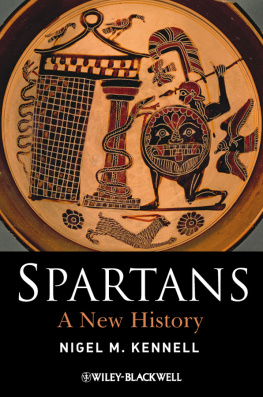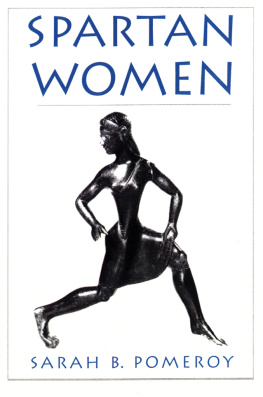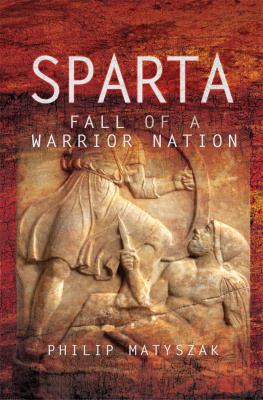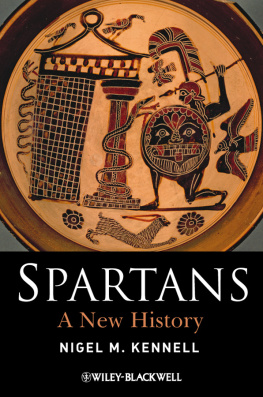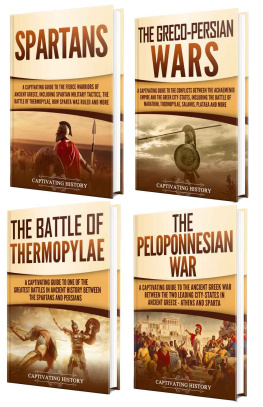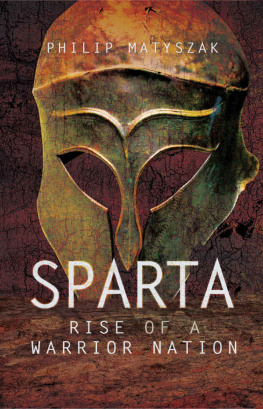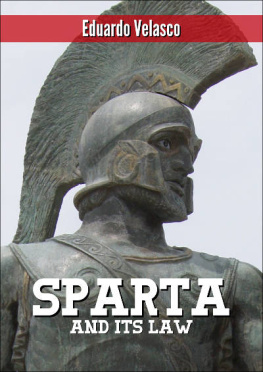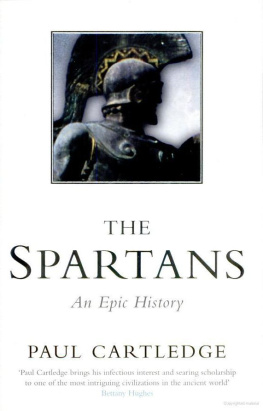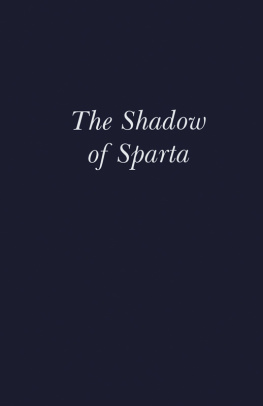Ancient Cultures
These enjoyable, straightforward surverys of key themes in ancient culture are ideal for anyone new to the study of the ancient world. Each book reveals the excitement of discovering the diverse lifestyles, ideals, and beliefs of ancient peoples.
Published
Spartans
Nigel Kennell
Sport and Spectacle in the Ancient World
Donald G. Kyle
Food in the Ancient World
John M. Wilkins and Shaun Hill
Greek Political Thought
Ryan K. Balot
Sexuality in Greek and Roman Culture
Marilyn B. Skinner
Theories of Mythology
Eric Csapo
In preparation
Medicine in the Ancient World
Markham J. Geller
Science in the Ancient World
Daryn Lehoux
Ethnicity and Identity in the Ancient World
Kathryn Lomas
Roman Law and Society
Thomas McGinn
Economies of the Greek and Roman World
Jeremy Paterson
Economies of the Greco-Roman World
Gary Reger
The City of Rome
John Patterson
Family in Greek and Roman Culture
Emma Griffiths and Tim Parkin

This edition first published 2010 2010 Nigel M. Kennell
Blackwell Publishing was acquired by John Wiley & Sons in February 2007. Blackwells publishing program has been merged with Wileys global Scientific, Technical, and Medical business to form Wiley-Blackwell.
Registered Office
John Wiley & Sons Ltd, The Atrium, Southern Gate, Chichester, West Sussex, PO19 8SQ, United Kingdom
Editorial Offices
350 Main Street, Malden, MA 02148-5020, USA
9600 Garsington Road, Oxford, OX4 2DQ, UK
The Atrium, Southern Gate, Chichester, West Sussex, PO19 8SQ, UK
For details of our global editorial offices, for customer services, and for information about how to apply for permission to reuse the copyright material in this book please see our website at www.wiley.com/wiley-blackwell.
The right of Nigel M. Kennell to be identified as the author of this work has been asserted in accordance with the Copyright, Designs and Patents Act 1988.
All rights reserved. No part of this publication may be reproduced, stored in a retrieval system, or transmitted, in any form or by any means, electronic, mechanical, photocopying, recording or otherwise, except as permitted by the UK Copyright, Designs and Patents Act 1988, without the prior permission of the publisher.
Wiley also publishes its books in a variety of electronic formats. Some content that appears in print may not be available in electronic books.
Designations used by companies to distinguish their products are often claimed as trademarks. All brand names and product names used in this book are trade names, service marks, trademarks or registered trademarks of their respective owners. The publisher is not associated with any product or vendor mentioned in this book. This publication is designed to provide accurate and authoritative information in regard to the subject matter covered. It is sold on the understanding that the publisher is not engaged in rendering professional services. If professional advice or other expert assistance is required, the services of a competent professional should be sought.
Library of Congress Cataloging-in-Publication Data
Kennell, Nigel M.
Spartans : a new history / Nigel M. Kennell.
p. cm. (Ancient cultures)
Includes bibliographical references and index.
ISBN 978-1-4051-2999-2 (hardcover : alk. paper) ISBN 978-1-4051-3000-4 (pbk. : alk. paper) 1. Sparta (Greece) History. 2. Sparta (Greece) History, Military. 3. Sparta (Greece)Biography. I. Title.
DF261.S8K45 2010 938.9-dc22
2009005158
Illustrations
Map
The city of Sparta
Figures
| The Eurotas river south of Sparta |
| The Eurotas valley from the north |
| Sparta and Taygetus from the Menelaeum |
| Remains of the Amyclaeum |
| The temple and terrace of the Menelaeum |
| The foundations of the temple of Athena Chalcioecus |
| View west from the acropolis of Geronthrae to the Eurotas valley |
| The Round Building, now identified as the Chorus, site of the Gymnopaediae dances |
| The Tomb of the Lacedaemonians in Athens |
| The early Roman theater on the acropolis |
| Inscriptions on the east parodos wall of the theater |
| Remains of the temple and amphitheater at the sanctuary of Artemis Orthia |
Map 1 The city of Sparta
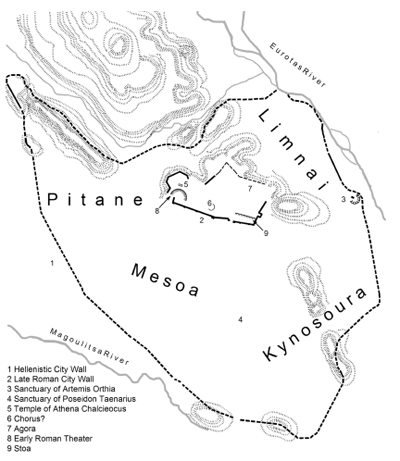
Introduction
Spartans had disembarked from their triremes that day in 404 B.C.E. Now they stood on the soil of Attica, watching with the assembled crowds as imperial Athens walls came tumbling down to the music of flute- girls hired for the occasion. The empire that had spread democracy at spear point, massacred whole populations in the name of preserving its freedom, and become an object of vilification to most Greeks was no more. Months of negotiations after the spectacular Spartan naval victory at distant Aegospotami on the Hellespont the previous year had only served to reinforce the Spartans supremacy and confirm their position as the ultimate arbiters of any Greek citys fate. Spartas popularity was also at its peak. It was a time when, as the historian Xenophon wrote, people thought that freedom for Greece began on that day. The long and bitter Peloponnesian War was over. Spartas position seemed unassailable.
But the Greeks knew that such successes as the Spartans enjoyed brought the danger of hubris, overconfidence in ones own abilities, which leads ultimately to at, ruinous destruction. So it was with Sparta. Within the adult lifespan of a single man, the city went from undisputed leader of the Greeks to a bit-player on the regional scene, because of a single event Spartas stunning defeat by the Thebans at the battle of Leuctra in central Greece in 371 B.C.E. Stripped of the majority of their most productive farmland two years later, the Spartans had to endure the humiliation of seeing an independent city-state founded on that very land for their own former farm slaves by Greeces new great power. It was a blow from which Sparta never fully recovered.
How did this happen? How did such a successful military power collapse so rapidly? Was it just fate? Chance? The inexorable laws of history? What were the immediate factors in the years following Spartas victory over Athens? Were there deeper reasons characteristics, even flaws embedded in the very fabric of Spartan society? These are among the questions about ancient Sparta that have intrigued historians for millennia, since the time of Aristotle in fact. Endeavoring to reach answers to them has gradually come to involve the weighing of a wide array of different sorts of evidence literary, archaeological, epigraphical, and to an increasing extent in recent years, anthropological to pierce the fog surrounding the notion of Sparta.
The Spartans of our imagination are familiar from films, novels, comics, and even certain history books. The men were ruled by iron discipline and an utter devotion to the laws of their city and the freedom of Greece; the women were more or less equivalent to the liberated women of modern times. These images of the Spartan way of life have been transmitted down through the centuries from the pens of ancient Greek and Roman writers through the scribes of the Middle Ages to the Renaissance humanists and thence to the scriptwriters, pundits, and novelists of the twenty-first century. It is a remarkably consistent picture that has stood the test of time. In recent years, however, the traditional view of Sparta has come under increasingly intense scrutiny as historians and archaeologists apply new techniques, perspectives, and occasionally even new pieces of evidence to the question of what it was to be a Spartan.

